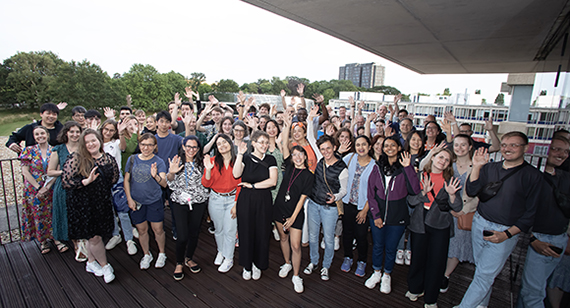Please note: This course will be taught online only. In person study is not available for this course.

Juan Masullo is an Assistant Professor in the Department of Social and Political Sciences at the University of Milan and an Associate Researcher at the Institute of Political Science, Leiden University. He also serves as co-editor of Qualitative & Multi-Method Research, the biannual publication of the American Political Science Association’s (APSA) Qualitative and Multi-Method Research Section.
Juan’s research integrates diverse methods and forms of evidence—observational and experimental—often grounded in immersive fieldwork. He has conducted extensive research in Colombia, Mexico, Brazil, Ecuador, and Italy, exploring how individuals and communities make decisions amid violence and how their lived experiences shape their political views and preferences toward peace, security, and democracy.
Methodologically, Juan is passionate about qualitative and mixed-methods research. He has years of experience conducting, teaching, and writing about fieldwork, interviewing, case study research, process tracing, and mixed-methods research. His article on aligning interviewing and process tracing, published in Sociological Methods & Research, received the 2025 APSA Alexander George Best Article Award, while his mixed-methods paper on the historical legacies of World War II partisan resistance in Italy, published in Comparative Political Studies, won the 2025 NEPS Medal for Best Publication in Peace Science. He regularly offers PhD-level methods training across Europe—in Germany, the Netherlands, the United Kingdom Italy—helping early-career researchers sharpen their methodological craft and connect it to meaningful empirical work.
Before joining the University of Milan and Leiden University, Juan taught and conducted research at the University of Oxford’s Department of Politics and International Relations (DPIR) and Nuffield College, at the Bremen International Graduate School of Social Science (BIGSSS), and at Yale University’s Program on Order, Conflict, and Violence (OCV). He earned his Ph.D. from the European University Institute.
You can learn more about his research, including publications and current projects, here: www.juanmasullo.com
Course description
This course delves into the essentials of qualitative research methods. It blends a theoretical and practical orientation with a twofold goal: help participants (a) become thoughtful and critical consumers of social science research that relies on qualitative methods, and (b) begin designing and implementing—depending on where they are in their own research journeys—solid projects that use qualitative approaches, on their own or in combination with quantitative ones.
The course is organized into three interconnected parts:
Part I discusses the kinds of questions qualitative methods are best suited to answer, the logic of inference that underpins qualitative inquiry, and the most common within-case (e.g., process tracing) and cross-case (e.g., controlled comparison) research designs in contemporary social science.
Part II turns to the craft of data collection. We will explore well-established techniques—such as participant observation, interviews, and focus groups—as well as less conventional ones, including memory workshops and community mapping.
Part III addresses how to assess the quality and evidentiary strength of qualitative data. It also introduces key coding strategies and provides a hands-on overview of widely used tools (software) for data organization and analysis.
The course concludes with a short overview of mixed-methods designs, illustrating how qualitative within- and cross-case approaches can be effectively combined with quantitative analysis.
Learning Aims
By the end of the course, participants should be able to:
- Recognize and distinguish the most common qualitative research designs and techniques in the social sciences.
- Understand and critically assess methodological choices in published qualitative research.
- Identify the advantages and limits of different qualitative research designs and data types.
- Make sound and defensible design choices for their own qualitative (or mixed-methods) projects, aligning research questions, evidence, and methods in a coherent way.
Method of Instruction
The class combines interactive lectures and group discussions.
Lectures will introduce the session topics, drawing on both the existing literature and the instructor’s hands-on experience in the field. Group discussions will revolve around “dissecting research design” exercises—close readings of exemplary studies using the methods covered—as well as conversations grounded in participants’ own projects.
The course consists of 35 hours, distributed over 10 sessions, and will be held online. After each session, the instructor will remain in the virtual classroom for informal discussion. Dedicated time will also be set aside during class to talk through participants’ research designs and fieldwork plans.
Requirements
To make the most of the course, participants are expected to:
- Complete all mandatory readings before each session.
- Attend all sessions and take an active part in discussions.
- Complete a few short written exercises before and during the course.
Course outline:
PART I
Session 1
Research Questions in Qualitative Research
- What type of research questions are best suited for qualitative research? How to identify them and justify them?
Logics of Inference in Qualitative Research
- What type of inferences can we make when we do qualitative research? Descriptive and causal inference, and complementarities with logics of inference in quantitative methods and unified frameworks
Session 2
Cross-case Comparisons
- Why do we compare, what we compare, and how we compare?
- Structured and focused comparisons
- Controlled comparisons (most similar and most different designs)
- Selecting positive and (relevant) negative cases
- Comparative designs that do not rely on control as a central element
Session 3
Within-Case Analysis: Process Tracing I
- What is Process Tracing, and when to use it
- What are we tracing when we process trace?
- What are causal mechanisms, and who they differ from and relate to variables and outcomes
- Theorizing via causal mechanisms
Session 4
Within-Case Analysis: Process Tracing II
- Drawing causal graphs of mechanistic explanations
- Selecting cases for Process Tracing
- A word on the variety of approaches to Process Tracing (completeness standard, explicit Bayesian)
PART II
Session 5
Ethics in Qualitative Research
- Conversation based on major controversies in qualitative research
Participant Observation
- What is participant observation?
- When (and why) should we consider using them?
- What is unique about the data we collect via participant observation?
- Dissecting an application: focus on the need for immersive fieldwork
Session 6
Interviewing
- What is interviewing?
- When (and why) should we consider using them?
- What is unique about interview data?
- Dissecting an application: focus on sampling techniques
Session 7
Focus Groups
- What are focus groups, and how are they different from group interviews?
- When (and why) should we consider using them?
- Where does the method’s comparative advantage lie?
- Dissecting an application: focus on specificity of focus group-generated data
Memory Workshops & Community Mapping
- What are memory workshops and community mapping?
- When (and why) should we consider using them?
- What type of data can they yield
- Dissecting an application: do they add anything to interview data?
PART III
Session 8
Evidence in Qualitative Evidence
- Evaluating the probative value of evidence / evidentiary weight of data
- What does finding/not finding observable implications tell us about our claims?
- Can we trust what we found/not found?
Session 9
Coding Techniques
- Why, when, and how to code?
- Overview of different coding techniques
- Hands-on exercise: coding an interview transcript
Session 10
Overview of Mixed methods designs
- Two ways of mixing methods: Triangulation and Integration
- Case selection techniques for mixed-methods research
- Dissecting an application: What would we have missed if we had not combined qualitative and quantitative approaches?
Bibliography
Exemplary applications
Exemplars books of some of the methods covered in the class. Students should choose at least one book and read it as background for the course. Students will also have the opportunity to discuss the book in the part of the course that it is linked to.
Bourgois, Philippe. In Search of Respect: Selling Crack in El Barrio. Cambridge University Press, 2003. (ethnography, participant observation)
Slater, Dan. Ordering Power: Contentious Politics and Authoritarian Leviathans in Southeast Asia. Cambridge: Cambridge University Press, 2010. (cross-case comparisons, qualitative historical analysis)
Wood, Elisabeth J. Insurgent Collective Action and Civil War in El Salvador. Cambridge: Cambridge University Press, 2003. (interviewing, sub-national comparisons)
Key methods book to read (before the course)
Small, Mario L., and Jessica Mccrory Calarco. Qualitative Literacy: A Guide to Evaluating Ethnographic and Interview Research. Univ of California Press, 2022.
Overview of mandatory readings for the different course sessions
Inference in Qualitative Methods
King, Gary, Robert O. Keohane, and Sidney Verba. Designing Social Inquiry: Scientific Inference in Qualitative Research. Princeton University Press, 1994.
Goertz, Gary, and James Mahoney. A Tale of Two Cultures: Qualitative and Quantitative Research in the Social Sciences. Princeton University Press, 2012.
Fairfield, Tasha, and Andrew E. Charman. Social Inquiry and Bayesian Inference: Rethinking Qualitative Research. Cambridge University Press, 2022.
Cross-case Comparisons
Przeworski, Adam and Henry Teune. 1970. The Logic of Comparative Social Inquiry. New York: Wiley. Ch 2, “Research Designs,” pp.31-46.
George, Alexander L. and Andrew Bennet. 2005. Case Studies and Theory Development in the Social Sciences. Cambridge: MIT Press. Ch. 3 “The Method of Structured, Focused Comparison,” pp. 67-72
Slater, Dan, and Daniel Ziblatt. “The Enduring Indispensability of the Controlled Comparison.” Comparative Political Studies 46, no. 10 (2013): 1301–27.
Simmons, Erica S., and Nicholas R. Smith, eds. Rethinking Comparison: Innovative Methods for Qualitative Political Inquiry. Cambridge University Press, 2021. https://doi.org/10.1017/9781108966009.
Within-case Analysis
Beach, Derek, and Rasmus Brun Pedersen. Process-Tracing Methods: Foundations and Guidelines. 2nd edition. University of Michigan Press, 2019.
Waldner, David. “Process Tracing and Qualitative Causal Inference.” Security Studies 24, no. 2 (2015): 239–50. https://doi.org/10.1080/09636412.2015.1036624.
Fairfield, Tasha, and Andrew E. Charman. “Explicit Bayesian Analysis for Process Tracing: Guidelines, Opportunities, and Caveats.” Political Analysis 25, no. 3 (2017): 363–80.
Ethics in Qualitative Research
The National Commission for the Protection of Human Subjects of Biomedical and Behavioral Research. 1979. Ethical Principles and Guidelines for the Protection of the Human Subjects of Research. Washington, D.C.: Department of Health, Educaon, and Welfare.
APSA. “A Guide to Professional Ethics in Political Science (2nd Edition).” 2012. http:// www.apsanet.org/portals/54/Files/Publications/APSAEthicsGuide2012.pdf
Wood, Elisabeth J. “The Ethical Challenges of Field Research in Conflict Zones.” Qualitative Sociology 29, no. 3 (2006): 373–86.
Kapiszewski, Diana, and Elisabeth J. Wood. “Ethics, Epistemology, and Openness in Research with Human Participants.” Perspectives on Politics, Cambridge University Press, March 15, 2021, 1–17.
Data collection techniques
Emerson, Robert M. Writing Ethnographic Fieldnotes. University of Chicago Press, 2011.
Cyr, Jennifer. Focus Groups for the Social Science Researcher. Cambridge University Press, 2019.
Gerson, Kathleen, and Sarah Damaske. The Science and Art of Interviewing. Oxford University Press, 2020.
Gonzalez-Ocantos, Ezequiel, and Juan Masullo. “Aligning Interviewing with Process Tracing.” Sociological Methods & Research, June 14, 2024.
Weiss, Robert S. Learning From Strangers: The Art and Method of Qualitative Interview Studies. Free Press, 1995.
Small, Mario L., and Jenna M. Cook. “Using Interviews to Understand Why: Challenges and Strategies in the Study of Motivated Action.” Sociological Methods & Research, 2021.
Coding
Saldana, Johnny. The Coding Manual for Qualitative Researchers. Third edition. SAGE Publications Ltd, 2015.
Mixed methods
Lieberman, Evan S. “Nested Analysis as a Mixed-Method Strategy for Comparative Research.” American Political Science Review 99, no. 3 (2005): 435–52.
Seawright, Jason. Multi-Method Social Science: Combining Qualitative and Quantitative Tools. Cambridge University Press, 2016.
Small, Mario L. “How to Conduct a Mixed Methods Study: Recent Trends in a Rapidly Growing Literature.” Annual Review of Sociology 37, no. 1 (2011): 57–86.



